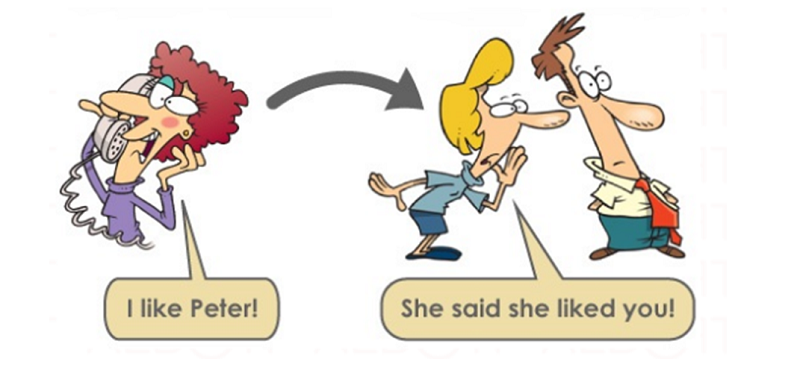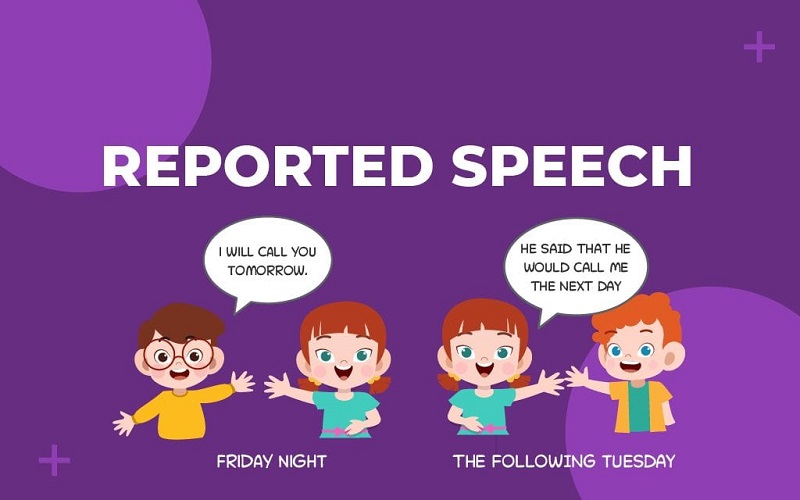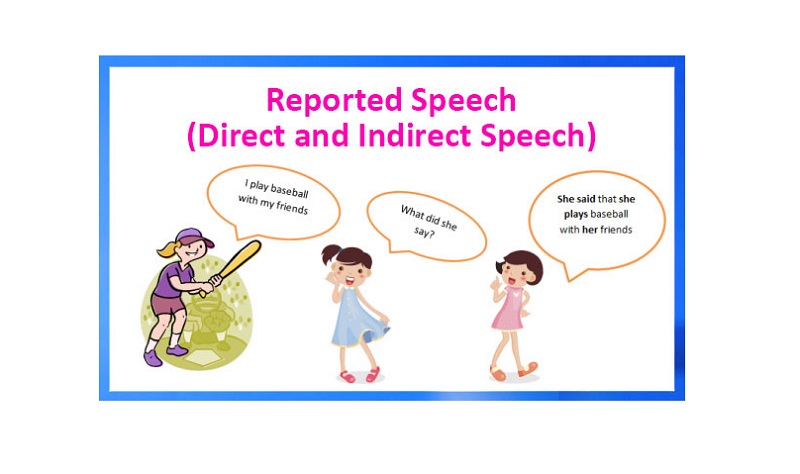Lùi thì là điểm ngữ pháp được sử dụng nhiều trong câu tường thuật và bắt buộc phải nhớ để tiếp thu tốt ngữ pháp khó về thời thì. Trong 10 phút sau đây, cùng IELTS Academic điểm qua quy tắc lùi thì trong tiếng Anh cũng như làm các bài tập kèm theo để nắm vững kiến thức hơn nhé!
Mục lục
Câu tường thuật là gì?
Câu tường thuật, hay còn gọi là câu gián tiếp, là câu được dùng khi chúng ta muốn thuật lại hay kế lại một câu mà người khác đã nói.

>>> Xem thêm: Kiến thức liên từ tương quan trong tiếng Anh có bài tập
Cách chuyển từ câu trực tiếp sang câu tường thuật
1. Thay đổi động từ
Thì của các động từ trong lời nói gián tiếp thay đổi theo một nguyên tắc chung là lùi về quá khứ (các thì xuống cấp):
| Direct Speech | Reported Speech |
| 1. Present Simple:V1 Ex 1: Nam said “I am told to be at school before 7 o’clock” Ex 2: He said “ I like beer” | 1. Past Simple:V2/ed Ex 1: Nam said (that) he was told to be at school before 7 o’clock. Ex 2: He said (that) He liked beer |
| 2. Present Progressive: am/is/are +Ving Ex: He said “I’m watching TV” | 2. Past Progressive:was/were+Ving Ex: He said (that) he was watching TV |
| 3. Present Perfect: has/have + V3/ed Ex: He said “ I have just bought a new book” | 3. Past Perfect: had + V3/ed Ex: He said (that) I had just bought a new book |
| 4. Past Simple: V2/ed Ex: They said “ We came by car ” | 4. Past Perfect: had + V3/ed Ex: They said (that) they had come by car |
| 5. Past Progressive: was/were + V-ing Ex: He said “I was sitting in the park at 8 o’clock” | 5. was/were+V-ing or Past Perfect progressive Ex: – He said ( that ) he was sitting in the park at 8 o’clock” – He said ( that )he had been sitting in the park at 8 o’clock” |
| 6. Past Perfect: had + V3/ed Ex: She said “ My money had run out” | 6. Past Perfect: had + V3/ed Ex: She said ( that) her money had run out |
| 7. Future Simple: will +V without to (V0) Ex: Lan said “I’ll phone you” | 7. would + V without to ( Vo) Ex: Lan said ( that) she would phone me |
| 8. can Ex: He said “ you can sit here” | 8. could Ex : He said ( that) we could sit there |
| 9. may Ex: Mary said “I may go to Ha noi again” | 9. might Ex: Mary said ( that) shemight go to Ha noi again |
| 10. must Ex: He said “I must finish this report” | 10. must/ had to Ex: He said ( that)he had to finish that report |
>>> Tham khảo: Kiến thức liên từ phụ thuộc trong tiếng Anh có bài tập
* Chú ý: Một số trường hợp không đổi thì của động từ trong câu gián tiếp:
– Nếu động từ ở mệnh đề giới thiệu được dùng ở thì hiện tại đơn, hiện tại tiếp diễn, hiện tại hoàn thành hoặc tương lai đơn, thì của động từ trong câu gián tiếp vẫn không thay đổi
Eg: He says/ he is saying/ he has said/ he will say, “the text is difficult”.
-> He says/ is saying/ has said/ will say (that) the text is difficult.
– Khi câu nói trực tiếp thể hiện một chân lý hoặc một hành động lặp lại thường xuyên, thì của động từ trong câu gián tiếp vẫn không thay đổi
Eg: My teacher said “The sun rises in the East”
-> My teacher said (that) the sun rises in the East.
He said, ‘My father always drinks coffee after dinner’
-> He said (that) his father always drinks coffee after dinner
– Nếu lúc tường thuật, điểm thời gian được đưa ra trong lời nói gián tiếp vẫn chưa qua, thì của động từ và trạng từ thời gian vẫn được giữ nguyên
Eg: He said, “ I will come to your house tomorrow”
-> He said (that) he will come to my house tomorrow.
– Câu trực tiếp có dạng câu điều kiện loại 2 hoặc loại 3:
Eg: He said; “If I knew her address, I would write to her”
-> He said that he would write to her If he knew her address
Eg: She said, “If I had enough money, I would buy a new bicycle.”
-> She said (that) if she had enough money, she would buy a new bicycle.
Eg: The teacher said, “If John had studied harder, he wouldn’t have failed his exam.”
-> The teacher said (that) if John had studied harder, he wouldn’t have failed his exam.
Tuy nhiên nếu lời nói trực tiếp là câu điều hiện loại 1 thì được chuyển sang loại 2 ở lời nói gián tiếp
Eg: The advertisement said; “If you answer the questions correctly, you may win one million dollar”
-> The advertisement said that I might win one million dollar If I answered the questions correctly.
– Không thay đổi thì của mệnh đề sau “wish’
Eg: He said; “I wish I had a lot of money”
-> He wishes (that) he had a lot of money
– Không thay đổi thì của mệnh đề sau “It’s (high/ about) time”
Eg: She said; “It’s about time you went to bed; children”
-> She told her children that It’s about time they went to bed
– Không thay đổi thì của mệnh đề đi sau ‘would rather, would sooner”
Eg: She said; “I would rather you stayed at home”
-> She said that she would rather I stayed at hone
>>> Tham khảo: Had been ving là thì gì trong tiếng Anh
– Không thay đổi thì của:
Could, would, might, should
Ought, had better, need -> trong câu nói gián tiếp
Nhưng must -> had to/ must
Eg: She said; “I could do the homework
-> She said the she could do the homework
– Động từ trong câu nói trực tiếp có thời gian xác định:
Eg: He said, “I was born in 1980”
-> he said that he was born in 1980.
– Mệnh đề trạng ngữ chỉ thời gian trong câu phức có thì quá khứ đơn và quá khứ tiếp diễn
Eg: “I saw him when he was going to the cinema”
She said she saw him when she was going to the cinema
>>> Xem thêm: Điểm danh sách tất cả các loại từ trong tiếng Anh
2. Thay đổi về đại từ nhân xưng, đại từ sở hữu, tính từ sở hữu

| Đại từ nhân xưng | Trực tiếp | Gián tiếp |
| Chủ ngữ | IWe You | He, sheTheyThey/he/she/I |
| Tân ngữ | MeUsYou | Him/herThemThem/him/her |
| Tính từ sở hữu | MyOurYour | His/herTheirTheir/his/her/my |
| Đại từ sở hữu | MineOursYours | Him/hersTheirsTheirs/his/hers |
3. Thay đổi về từ chỉ thời gian và nơi chốn
| Trực tiếp | Gián tiếp |
| Today/ tonight | that day/ that night |
| Yesterday | the day before/ the previous day |
| last month/ night … | the month before / the previous month/ night |
| Tomorrow | the following day/ the next day |
| this moth | that month |
| The day before yesterday | two days before |
| The day after tomorrow | in two days’ time |
| next month | the month after / the following month |
| Here | there |
| Now | then |
| Ago | before |
| This | that |
| These | those |
* Chú ý:
- Nếu tường thuật vẫn cùng ở 1 địa điểm và thời gian, chúng ta không thay đổi thì của động từ, tính từ chỉ định và trạng ngữ thời gian và nơi chốn.
eg: He said “I will come here to take this book tonight”.
-> An hour ago he said he will come here to take this book tonight.
– Thêm liên từ vào câu tường thuật chỉ nguyên nhân
Eg: She said “ I am very tired I have worked overnight.”
-> She said she was very tires because she had been worked.
Bài tập về quy tắc lùi thì trong tiếng Anh có đáp án

I. Turn these sentences into Reported speech.
1. She said,” I can’t find my umbrella”
___________________________________________________________
2. They said, “We are learning English now”
___________________________________________________________
3. “ My friend is coming next week”, Tom said.
___________________________________________________________
4. “ I’ll help my mum with housework this weekend”
___________________________________________________________
5. “We shall overcome this difficulty”, they said
___________________________________________________________
6. “ My father is a doctor here”, my friend said
___________________________________________________________
7. “I am going on holiday tomorrow”, the boy said to his neighbor.
___________________________________________________________
8. “ You will have to finish all these exercises before next week”, the teacher said to his students
___________________________________________________________
9. “ I came back here early yesterday,” she said.
___________________________________________________________
10. “ I’ve broken the vase,” she said
___________________________________________________________
11. “ I will never see you again,” the boy said to the girl.
___________________________________________________________
12. He said to her, “You are my friend.”
___________________________________________________________
13. Johnny said to his mother, “I don’t know how to do this axercise.”
___________________________________________________________
14. “We are waiting for the school bus”, said the chidren.
___________________________________________________________
15. Marry said, “My father died a year ago”.
___________________________________________________________
16. John said, “I have finished studying my lesson”.
___________________________________________________________
17. Mary said, “I can not go to the movies with you, John”.
___________________________________________________________
18. “I shall expect to see you next Wednesday.” Mary said to her friend.
___________________________________________________________
19. He said, “I don’t know what happened.”
________________________________________________
20. She said, “I went to the doctor yesterday.”
________________________________________________
21. He said, “I have a toothache.”
________________________________________________
22. She said, “I’ll write him a prescription.”
________________________________________________
23. They said, “We’re going to the drugstore.”
________________________________________________
24. He said, “The doctor gave me some pills.”
________________________________________________
25. She said, “I go to the supermarket every day.”
________________________________________________
26. He said, “I have received the envelope.”
________________________________________________
27. They said, “We visited Cannery Row.”
________________________________________________
28. She said, “I feel very sick.”
________________________________________________
29. He said, “I bought some popcorn.”
________________________________________________
30. They said, “We’re flying to California.”
________________________________________________
31. He said, “I’m cutting off the main valve.”
________________________________________________
32. Nam said, “my uncle often plants the vegetables in the afternoon.”
……………………………………………………………………… …
33. “My uncle will not plant the vegetables tomorrow afternoon”, she said.
……………………………………………………………………………….
34. “Mr and Mrs Pike have just read these newspapers”, Nga said.
……………………………………………………………………………
35. She said, “I often listen to music at night.”
………………………………………………………
36. Lan’s mother said, “ My daughter usually brushes her teeth before meals.”
…………………………………………………………………………………
37. They said, “We have to do the assignments now.”
…………………………………………………………….
38. Lan says, “My sister seldom rides a bike to school.”
…………………………………………………………
39. They said, “Our teacher sometimes explains the difficult lesson.”
………………………………………………………………………….
40. Nam said, “ I am doing my homework now.”
…………………………………………………………
II. Change the sentences below into direct speech.
1. My mother told me that she was sad then.
-> ___________________________________________________________
2. One of my friends said that she liked learning English with her teacher.
->___________________________________________________________
3. The doctor told me that I could leave the hospital that day.
-> ___________________________________________________________
4. The film director said that she was willing to work then.
->___________________________________________________________
5. The teacher told his students that he would be busy the following month.
-> ___________________________________________________________
6. Tom invited me to his birthday party.
-> ___________________________________________________________
7. She said the doctor had written her a prescription.
________________________________________________
8. He said that he had a toothache.
________________________________________________
9. She said she went to the museum every day.
________________________________________________
10. They said they were going to the supermarket.
________________________________________________
11. She said that the doctor had given her some pills.
________________________________________________.
III. Change the following sentences into reported speech:
1. “Open the door,” he said to them.
-He told them………………………………………………………….
2. “Where are you going?” he asked her.
-He asked her where…………………………………………………
3. “Which way did they go?” he asked.
-He asked… …………………………………………………………….
4. “Bring it back if it doesn’t fit”, I said to her.
-I told… ………………………………………………………………….
5. “Don’t try to open it now,” she said to us.
-She told… ………………………………………………………………
6. “Is it going to be a fine day today?” I asked her.
-I asked her… …………………………………………………………..
7. “He’s not at home”, she said.
-She said that… ………………………………………………………..
8. “Is the bus station far away?” the girl asked.
-The girl wanted to know… ……………………………………….
9. “Don’t stay out late, Ann” Tom said.
-Tom told Ann… ………………………………………………………
10. “Please let me borrow your car,” he said to her.
-He asked… ………………………………………………………………
11. “Jean, have you seen my gloves?” Thomas asked.
-Thomas asked Jean…..
12. Don’t leave the window open, Mary”, I said.
-I told Mary…. ………………………………………………………….
13. “I’ll have a cup of tea with you,” she said.
She said that…
14. “I’ll pay him if I can” she said.
-She said that… ………………………………………………………….
15. “What are you going to do next summer?” she asked.
– She asked us…. ………………………………………………………….
16. “I’ll phone you tomorrow,” he told Jack.
-He told Jack that…. …………………………………………………….
17. “Can I sit beside you, Jean?” Tom asked.
-Tom asked Jean…. ……………………………………………………..
18. “I want a camera for my birthday,” he said.
-He said that…. ………………………………………………………….
19. “Don’t keep the door locked,” he said to us.
-He told us…. ………………………………………………………….
20. “How long are you going to stay?” I asked him.
-I asked him how long….
ĐÁP ÁN
1. He told them to open the door.
2. He asked her where she was going.
3. He asked me which way they had gone.
4. I told her to bring it back if it didn’t fit.
5. She told us not to try to open it then.
6. I asked her whether/ if it was going to be a fine day that day.
7. She said that he was not at home.
8. The girl wanted to know whether/ if the bus station was far away.
9. Tom told Ann not to stay out late.
10. He asked her to let him borrow her car.
11. Thomas asked Jean whether/if she had seen his gloves.
12. I told Mary not to leave the window open.
13. She said that she would have a cup of tea with me.
14. She said that she would pay him if she could.
15. She asked us what we were going to do the following summer.
16. He told Jack that he would phone him the following day.
17. Tom asked Jean whether/if he could sit beside her.
18. He said that he wanted a camera for his birthday.
19. He told us not to keep the door locked.
20. I asked him how long he was going to stay.
Trên đây là những kiến thức về lý thuyết và bài tập về quy tắc lùi thì mà IELTS Academic cung cấp nhằm giúp các bạn ôn luyện và nắm vững kiến thức. Chúc các bạn nhanh chóng nắm vững kiến thức này. Bạn hãy ghé thăm IELTS Academic để có thêm kiến thức mỗi ngày nhé!

